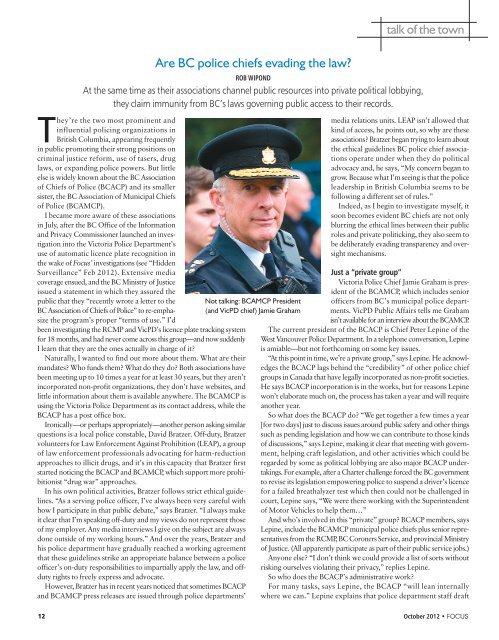**October 2012 Focus - Focus Magazine
**October 2012 Focus - Focus Magazine
**October 2012 Focus - Focus Magazine
Create successful ePaper yourself
Turn your PDF publications into a flip-book with our unique Google optimized e-Paper software.
They’re the two most prominent and<br />
influential policing organizations in<br />
British Columbia, appearing frequently<br />
in public promoting their strong positions on<br />
criminal justice reform, use of tasers, drug<br />
laws, or expanding police powers. But little<br />
else is widely known about the BC Association<br />
of Chiefs of Police (BCACP) and its smaller<br />
sister, the BC Association of Municipal Chiefs<br />
of Police (BCAMCP).<br />
I became more aware of these associations<br />
in July, after the BC Office of the Information<br />
and Privacy Commissioner launched an investigation<br />
into the Victoria Police Department’s<br />
use of automatic licence plate recognition in<br />
the wake of <strong>Focus</strong>’ investigations (see “Hidden<br />
Surveillance” Feb <strong>2012</strong>). Extensive media<br />
coverage ensued, and the BC Ministry of Justice<br />
issued a statement in which they assured the<br />
public that they “recently wrote a letter to the<br />
BC Association of Chiefs of Police” to re-emphasize<br />
the program’s proper “terms of use.” I’d<br />
been investigating the RCMP and VicPD’s licence plate tracking system<br />
for 18 months, and had never come across this group—and now suddenly<br />
I learn that they are the ones actually in charge of it?<br />
Naturally, I wanted to find out more about them. What are their<br />
mandates? Who funds them? What do they do? Both associations have<br />
been meeting up to 10 times a year for at least 30 years, but they aren’t<br />
incorporated non-profit organizations, they don’t have websites, and<br />
little information about them is available anywhere. The BCAMCP is<br />
using the Victoria Police Department as its contact address, while the<br />
BCACP has a post office box.<br />
Ironically—or perhaps appropriately—another person asking similar<br />
questions is a local police constable, David Bratzer. Off-duty, Bratzer<br />
volunteers for Law Enforcement Against Prohibition (LEAP), a group<br />
of law enforcement professionals advocating for harm-reduction<br />
approaches to illicit drugs, and it’s in this capacity that Bratzer first<br />
started noticing the BCACP and BCAMCP, which support more prohibitionist<br />
“drug war” approaches.<br />
In his own political activities, Bratzer follows strict ethical guidelines.<br />
“As a serving police officer, I’ve always been very careful with<br />
how I participate in that public debate,” says Bratzer. “I always make<br />
it clear that I’m speaking off-duty and my views do not represent those<br />
of my employer. Any media interviews I give on the subject are always<br />
done outside of my working hours.” And over the years, Bratzer and<br />
his police department have gradually reached a working agreement<br />
that these guidelines strike an appropriate balance between a police<br />
officer’s on-duty responsibilities to impartially apply the law, and offduty<br />
rights to freely express and advocate.<br />
However, Bratzer has in recent years noticed that sometimes BCACP<br />
and BCAMCP press releases are issued through police departments’<br />
Are BC police chiefs evading the law?<br />
ROB WIPOND<br />
At the same time as their associations channel public resources into private political lobbying,<br />
they claim immunity from BC’s laws governing public access to their records.<br />
Not talking: BCAMCP President<br />
(and VicPD chief) Jamie Graham<br />
talk of the town<br />
media relations units. LEAP isn’t allowed that<br />
kind of access, he points out, so why are these<br />
associations? Bratzer began trying to learn about<br />
the ethical guidelines BC police chief associations<br />
operate under when they do political<br />
advocacy and, he says, “My concern began to<br />
grow. Because what I’m seeing is that the police<br />
leadership in British Columbia seems to be<br />
following a different set of rules.”<br />
Indeed, as I begin to investigate myself, it<br />
soon becomes evident BC chiefs are not only<br />
blurring the ethical lines between their public<br />
roles and private politicking, they also seem to<br />
be deliberately evading transparency and oversight<br />
mechanisms.<br />
Just a “private group”<br />
Victoria Police Chief Jamie Graham is president<br />
of the BCAMCP, which includes senior<br />
officers from BC’s municipal police departments.<br />
VicPD Public Affairs tells me Graham<br />
isn’t available for an interview about the BCAMCP.<br />
The current president of the BCACP is Chief Peter Lepine of the<br />
West Vancouver Police Department. In a telephone conversation, Lepine<br />
is amiable—but not forthcoming on some key issues.<br />
“At this point in time, we’re a private group,” says Lepine. He acknowledges<br />
the BCACP lags behind the “credibility” of other police chief<br />
groups in Canada that have legally incorporated as non-profit societies.<br />
He says BCACP incorporation is in the works, but for reasons Lepine<br />
won’t elaborate much on, the process has taken a year and will require<br />
another year.<br />
So what does the BCACP do? “We get together a few times a year<br />
[for two days] just to discuss issues around public safety and other things<br />
such as pending legislation and how we can contribute to those kinds<br />
of discussions,” says Lepine, making it clear that meeting with government,<br />
helping craft legislation, and other activities which could be<br />
regarded by some as political lobbying are also major BCACP undertakings.<br />
For example, after a Charter challenge forced the BC government<br />
to revise its legislation empowering police to suspend a driver’s licence<br />
for a failed breathalyzer test which then could not be challenged in<br />
court, Lepine says, “We were there working with the Superintendent<br />
of Motor Vehicles to help them…”<br />
And who’s involved in this “private” group? BCACP members, says<br />
Lepine, include the BCAMCP municipal police chiefs plus senior representatives<br />
from the RCMP, BC Coroners Service, and provincial Ministry<br />
of Justice. (All apparently participate as part of their public service jobs.)<br />
Anyone else? “I don’t think we could provide a list of sorts without<br />
risking ourselves violating their privacy,” replies Lepine.<br />
So who does the BCACP’s administrative work?<br />
For many tasks, says Lepine, the BCACP “will lean internally<br />
where we can.” Lepine explains that police department staff draft<br />
12 October <strong>2012</strong> • FOCUS
















